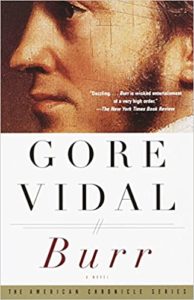
On my vacation in Canada, I’m enjoying Gore Vidal’s novel Burr immensely. Of course it’s a novel and so it’s not necessarily accurate. Vidal admits in an Afterword that he attributes motives and makes up dialogue. But he also points out that he uses known phrases from various speakers. I’m becoming quite impressed with Aaron Burr, or should I say “aaon buhr.”
Two U.S. historian friends tell me that the novel is right in many particulars.
Here’s a short monologue in which Burr explains the various political parties in 1834 and how they had morphed:
Van Buren will be nominated and he will defeat Clay or any other National Republican—no, no, Whig. I must get used to calling them that. How topsy-turvy it is! Those of us who were for the Revolution were Whigs. Those for Britain were Tories. Then there was the fight over the federal Constitution. In our state [New York] Governor Clinton wanted a weak federal government. So some of the Whigs became anti-Federalist and some like Hamilton became Federalist. Then the Tory-Federalists became Republican. Now Tory-Federalist-Republicans call themselves Whig though they are anti-Whig while the anti-Federalist Republicans are now Jacksonian Democrats.
I posted about a non-fiction book on Burr here.


READER COMMENTS
Jerry Brown
Aug 5 2021 at 1:40am
I’m hoping you enjoy your vacation.
Is the explanation about the various political parties something aaon buhr actually said or is that part of Vidal’s novel? Either way, it is difficult to follow that explanation.
And why are you working for the dairy industry while you are on vacation?
Actually the link was quite humorous at least for me 🙂 Thanks.
David Henderson
Aug 5 2021 at 5:46am
Thanks, Jerry.
The quote is from the novel.
Alan Goldhammer
Aug 5 2021 at 11:53am
All of Vidal’s political novels are very good!!
Comments are closed.